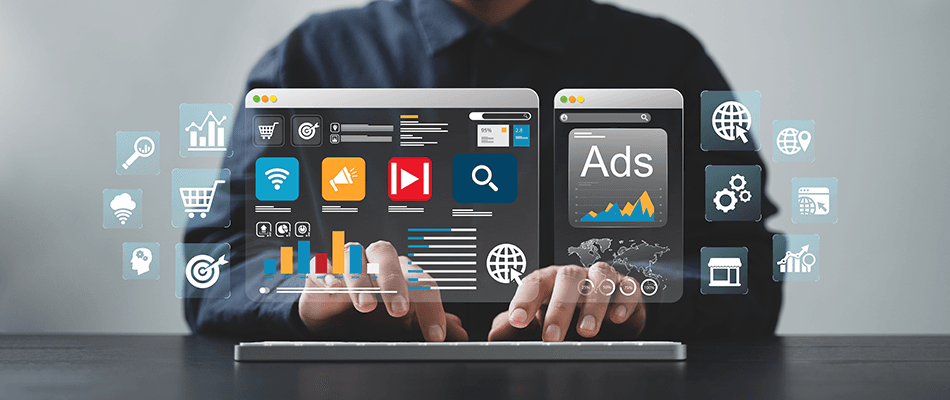What Is Influencer Marketing? Explore Types, Benefits, and Strategies
Influencers are individuals who have built a large and loyal following on social media, ranging from celebrities to everyday people with a significant online presence. Their ability to shape opinions and influence purchasing decisions has made them valuable partners for brands. This is where influencer marketing comes in. It allows brands to collaborate with these individuals to promote products or services. They help them connect with their audience in an authentic and impactful way.
Understanding what is influencer marketing is essential for businesses that want to build trust and engage their customers personally. By choosing the right influencers, brands can reach specific demographics and make their campaigns more relatable.
In this article, we will explore the different types of influencer marketing, the benefits it offers to businesses, and strategies to create successful campaigns.
What is Influencer Marketing?
Influencer marketing is a promotional strategy where businesses collaborate with influencers. To understand what is influencer marketing, it is important to understand that it’s a method that relies on the influencer’s authenticity and trust to create meaningful connections with their audience. By utilising these qualities, brands can create meaningful connections, increase awareness, and build credibility. Influencers can drive customer engagement by creating content that resonates with their followers, encouraging them to interact with the brand. This not only increases brand awareness but also helps build trust and loyalty, which fosters long-term growth.
Types of Influencers
Influencers are individuals who have a dedicated and engaged audience on social media or other platforms. They are categorised based on the size of their audience and the type of engagement they generate. Understanding these categories helps businesses determine which type aligns best with their marketing goals. When considering what is influencer marketing, the choice of influencer, whether mega, macro, micro, or nano, plays a crucial role in campaign success. Each type has unique strengths suited to specific brand needs. Let’s understand the types of influencers in more detail:
1. Mega-Influencers
Mega-influencers are individuals with a follower base of a million and exceeding. They are typically celebrities or prominent public figures. Their massive reach makes them ideal for large-scale brand awareness campaigns, but their services often come with higher costs and less personal engagement with audiences.
2. Macro-Influencers
Macro-influencers usually have between 100,000 and 1 million followers. They are well-known figures within specific industries or communities and offer a balanced approach to reach and engagement. They are more accessible than mega-influencers and work well to build brand recognition.
3. Micro-Influencers
Micro-influencers have a following of 10,000 to 100,000 people. While understanding what influencer marketing is, we learn that micro-influencers show how niche audiences can drive authentic engagement. Their followers often see them as relatable and trustworthy, making them perfect for brands targeting specific groups. They are also more affordable and maintain closer interactions with their audience.
4. Nano-Influencers
Nano-influencers have fewer than 10,000 followers but are highly influential within small, focused communities. Their relationships with their audience foster trust, making them effective for local or niche marketing strategies. They are particularly valuable for businesses looking to connect naturally with smaller but loyal audiences.
Explore Why to Choose Digital Marketing as a Career Here!
How Does Influencer Marketing Work?
Influencer marketing works by establishing partnerships between brands and influencers to promote products or services. As we learn what is influencer marketing, it’s essential to understand how collaboration between a brand and an influencer builds trust and connects with specific audiences.
By leveraging the influencer’s credibility and reach, brands can create genuine, engaging campaigns that resonate with their target market. In the following steps, we will learn how influencer marketing works:
1. Set Clear Goals and Strategy
Defining the objectives of your influencer marketing campaign is the first step. Determine whether your focus is on increasing brand awareness, driving sales, boosting engagement, or reaching a new audience. Set measurable KPIs (e.g., impressions, clicks, or sales) to track success and align your strategy with these goals.
2. Finding the Right Influencers
Identifying influencers who align with your brand is crucial. This can be done using tools like Upfluence or AspireIQ or through manual research. Factors such as audience demographics, originality, relevance, and engagement rates are essential for selection.
3. Build Relationships and Collaborate
Approach influencers with a clear pitch that outlines the campaign’s purpose and benefits for both parties. Foster authentic relationships by allowing creative freedom while ensuring the content aligns with your brand messaging. Collaboration may include sponsored posts, giveaways, or affiliate partnerships. When learning what influencer marketing is, it is important to understand how to build a connection with the target audience.
4. Create and Publish Content
Work with influencers to develop engaging content as per the target audience. Provide clear briefs but allow room for creativity to maintain credibility. Once finalised, the content is published on decided platforms, increasing your brand’s visibility through the influencer’s reach.
5. Measuring Success
The effectiveness of a campaign is evaluated using metrics like engagement rates, reach, impressions, and conversions. Analysing these metrics helps brands understand their ROI and refine future strategies for better outcomes.
Get insights on What Does A Digital Marketer Do here!
Benefits of Influencer Marketing
Influencer marketing offers several advantages for brands aiming to connect with their audience in a personal and meaningful way. Exploring what is influencer marketing helps us understand how it utilises trusted individuals to promote products by creating authentic connections that drive engagement. These are some benefits of influencer marketing:
1. Wider Reach
Brands can achieve a broader reach by collaborating with influencers who have large audiences. These influencers share content across their social platforms, representing the brand to a variety of followers who align with different markets. This helps brands access new and diverse demographics.
2. Authenticity
Influencers are seen as trustworthy figures, making their recommendations more credible. When influencers share experiences with products, their followers perceive these endorsements as unbiased and relatable, helping brands establish stronger connections with their audience.
3. Cost-Effectiveness
Working with micro- and nano-influencers is a budget-friendly approach that can deliver a significant impact. As we explore what is influencer marketing, we learn that these influencers often have higher engagement rates. This ensures the brand reaches an active and interested audience without requiring the high fees associated with mega influencers.
4. Boosts Conversions
Influencers personalise their endorsements, making the promotion feel less like an advertisement and more like a recommendation. This builds trust among followers, which translates into higher purchase rates and brand loyalty. Offering discounts or exclusive deals through influencers can further drive conversions.
5. Enhances Brand Awareness
While understanding what influencer marketing is, we learn that this marketing strategy plays a major role in boosting brand visibility. When influencers share content featuring a brand, their followers are introduced to its products or services. Repeated exposure through consistent collaborations helps strengthen brand recognition, making it more familiar and memorable to audiences.
6. Increases Customer Engagement
Influencers actively interact with their followers through comments, messages, and discussions, creating a sense of community. When they promote a product, this engagement also extends to the brand. By encouraging followers to ask questions, share feedback, or participate in activities like giveaways, brands experience higher interaction and build stronger customer relationships.
Explore the Types of Digital Marketing- All 8 Types You Should Know
Challenges in Influencer Marketing
Influencer marketing presents several challenges, such as finding the right fit, managing authenticity, and measuring Return on Investment (ROI). Brands also face difficulties with cost management, especially when working with high-profile influencers. Understanding what is influencer marketing strategy helps address these issues effectively. Some of the common challenges of influencer marketing are given below:
- Finding the Right Fit: Choosing influencers who resonate with the brand’s values and audience is essential. Misaligned partnerships can damage credibility and decrease campaign effectiveness.
- Measuring ROI: Tracking results from influencer campaigns is complex. Metrics like engagement and brand awareness help gauge success, but they may not directly convert into sales.
- Managing Authenticity: If influencers push overly promotional content, it can appear insincere to their audience. Maintaining authenticity is vital to ensure the campaign feels genuine and relatable.
- Cost Management: Collaborating with high-profile influencers can be expensive. Brands need to balance costs with expected returns to ensure the investment is worthwhile.
- Coordination with Influencers: Coordinating the messaging and timelines with influencers can be challenging. Clear communication is key to ensure the campaign runs smoothly and the influencer’s content aligns with brand goals.
How to Get Started with Influencer Marketing?
To get started with influencer marketing, you will require a clear understanding of your goals and audience. Knowing what is influencer marketing strategy helps shape how you approach campaigns, choose influencers, and track success. A solid plan ensures you’re making the most of your partnerships. Here are some tips and key steps you must follow to start with influencer marketing:
- Define Your Goals: Brands must have a clear objective, such as increasing brand awareness, generating leads, or driving sales. Having specific goals helps guide your influencer selection and campaign strategy, ensuring you achieve measurable results.
- Identify Your Audience: Understanding the demographics and interests of your target audience is crucial. Identifying their preferences helps select influencers who can reach and engage with the right people for your brand.
- Select Platforms: Focus on platforms where your audience spends the most time, whether it’s Instagram, TikTok, or YouTube. While exploring what influencer marketing is and how it works, we understand that each platform has unique features, and selecting the right one ensures your message resonates with your target group.
- Plan Campaigns: Create clear briefs and set goals for influencers. Provide guidance on messaging, goals, and timelines to ensure smooth execution and alignment with your brand’s vision.
- Track Performance: Use analytics tools to measure the impact of your campaign. Monitoring engagement rates, conversions, and other key metrics helps determine what’s working and how to refine future campaigns.
Read more on How to Start a Career in Digital Marketing here!
Why Choose Digital Marketing Course with Gen AI by Digital Regenesys?
The Digital Marketing Course with Gen AI by Digital Regenesys is a 28-week skill-based course that provides practical knowledge in social media marketing and paid advertising strategies. The curriculum covers various topics like influencer marketing, SEO, and content marketing. Additionally, it integrates advanced AI tools to enhance marketing strategies.
Benefits of enroling in the Digital Marketing Course with Gen AI by Digital Regenesys:
- In-depth Curriculum: Covers all key areas of digital marketing, from SEO and content marketing to influencer marketing and AI integration.
- Practical Learning: Hands-on experience with real-world digital marketing tools and strategies.
- Flexible Online Learning: Learn at your own pace using the online format.
- Globally Recognized Certification: Earn a certification that enhances your credibility in the digital marketing industry.
- Experienced Instructors: Learn from industry professionals with years of practical experience.
- AI-Driven Strategies: Master AI tools to optimise and personalise marketing campaigns.
In conclusion, influencer marketing is a powerful tool for brands looking to engage their target audience authentically. By understanding what is influencer marketing and utilising the right strategies, businesses can increase brand awareness, build trust, and drive conversions. If you’re interested in learning how to effectively use influencer marketing and other digital marketing techniques, the Digital Marketing Course with Gen AI by Digital Regenesys provides an excellent opportunity to gain practical skills and stay ahead in the industry.
Visit our website to learn more and take your first step by enrolling in this course!
What is Influencer Marketing? – FAQs
What is influencer marketing?
Influencer marketing involves collaborating with individuals who have a strong online following to promote products, building trust, awareness, and customer engagement.
How effective is influencer marketing?
Influencer marketing is effective when the right influencers are chosen, helping brands expand reach, build trust, and increase engagement, measured through key performance metrics.
What are the different types of influencers in marketing?
Influencers are categorised as mega, macro, micro, and nano, each offering different strengths, from broad reach to authentic and niche engagement.
How can I measure the success of influencer marketing?
Success is measured by metrics like engagement rates, reach, impressions, and conversions, which help evaluate ROI and improve future campaigns.
What is the role of authenticity in influencer marketing?
Authenticity is vital in influencer marketing. Genuine, relatable content builds trust, helping brands form stronger connections with their audience and enhancing campaign effectiveness.













